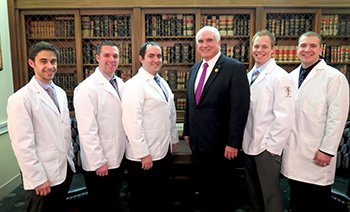Nearly 80 students from the Lake Erie College of Osteopathic Medicine (LECOM) recently traveled to Washington, D.C., to meet with elected officials and advocate for the profession during DO Day on Capitol Hill.
Students from LECOM’s campuses in Erie and Greensburg, Pa., and Bradenton, Fla., participated in the event, organized by the American Osteopathic Association (AOA). DO Day on Capitol Hill is an opportunity for both osteopathic medicine students and current DOs across the country to directly lobby members of Congress and their staffs relative to important health policy issues while increasing awareness of osteopathic medicine.
 |
| Cody Pollack, Shane Stegen, Brent Frossard and Brock Aldrich (second from right) were among the LECOM students to participate in DO Day. They are pictured with U.S. Rep. Mike Kelly and Cory Ondler (far right), a 2010 LECOM graduate. |
LECOM’s student contingent focused on two central issues during their meetings with the elected officials and their Health Legislative Assistants (HLAs):
Ensuring the Future Physician Workforce
The students urged the House and Senate to authorize funding beyond 2015 of the Teaching Health Center Graduate Medical Education (THCGME) program, which allows primary care residents to train in community-based settings like Teaching Health Centers. Residents from such settings are nearly three times more likely to practice in rural and medically underserved communities, which is in keeping with LECOM’s mission.
Rachel C. Powers, OMS1, said ensuring funding of the THCGME program is critical. “Some students probably aren’t as concerned as they should be about whether there will be a residency available for them, but I think we have to be proactive and monitor what happens in Congress,” she said. “We can’t be overconfident about the funding being extended.”
Other LECOM students, including Luna Y. Liu, OMS1, agreed that adequate funding for the THCGME program is critical. “As students, we want to know that a sufficient number of positions will be maintained,” she said.
Reforming Medicare Physician Payments
As physicians have faced uncertainty related to looming cuts to their Medicare payments, Congress has spent more than $150 billion on short-term “patches” because costs have exceeded sustainable growth rate (SGR) targets.
“These band-aid fixes have been extremely costly, and yet have failed to truly address the issue,” said Antonio Imbarlina, OMS2 and the political affairs officer of LECOM’s chapter of the Student Osteopathic Medical Association (SOMA).
Imbarlina and the other participating LECOM students urged passage of the SGR Repeal and Medicare Provider Payment Modernization Act, which would permanently rescind the sustainable growth rate formula used to calculate physician payments in Medicare. The legislation also would allow for a transition from the current fee-for-service model to one emphasizing quality over volume, and would allocate bonuses to physicians meeting performance thresholds.
Reforming Medicare physician payment is an important issue for medical students in part because of their high levels of indebtedness upon graduation, Imbarlina said. He estimates his loans will exceed $150,000; the American Medical Association puts the figure for graduates nationally from the class of 2012 at nearly $167,000.
Student loan debt, along with the lack of a long-term solution related to Medicare physician payment, tends to drive some graduates away from primary care and toward higher-paying specialties, Imbarlina said. “Another issue is that during residency, our compensation is limited,” he added. “The United States already has a shortage of primary care physicians, and it seems like we’re going further in the wrong direction.”
The recent agreement between the AOA, the American Association of Colleges of Osteopathic Medicine (AACOM) and the Accreditation Council for Graduate Medical Education (ACGME) on a single accreditation system for graduate medical education programs has only added to the degree of uncertainty, Imbarlina said.
The LECOM students also were grateful for the opportunity to get an up-close look at Washington politics. “It was exciting to have so many student doctors together and to observe the discussions and the process by which change happens,” said Morli Gandhi, OMS1.
Said Powers, “As future physicians, it’s important that we stay current on the issues that affect health care and make sure our voices are heard.”
Liu, who is from Minnesota, was excited about the opportunity to meet with elected officials as well as osteopathic medical students from across the country. “It was interesting to talk to them about curriculum, and preparing for board exams and how OMM is taught,” she said. “The unity among the students was amazing.”
Imbarlina, as SOMA political affairs officer, began coordinating LECOM’s participation in DO Day as far back as August, 2013. Considering the amount of planning required, he was pleased with the number of LECOM students who took the time to participate. In total, more than 1,200 DOs and students from schools and colleges of osteopathic medicine nationally participated, the second most in the event’s history.
“I think the numbers show that the next generation of physicians is paying attention to the future of health care, and that we care about the students who will follow us,” he said.

